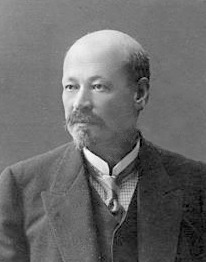Nikolai Matwejewitsch Kischner
Nikolai Kischner ( Russian Николай Матвеевич Кижнер ., Scientific transliteration Nikolaj Matveevič Kizner : English transcription Nikolai Kishner ; born November 27, jul. / 9. December 1867 greg. In Moscow ; † 28. November 1935 ) was a Russian chemist. His name is primarily associated with the Wolff-Kishner reaction .
Life
Nikolai Matwejewitsch Kischner was born in Moscow. After graduating from the 1st Moscow High School, he began studying at the natural sciences department of the physical-mathematical faculty of Moscow University . From the third year of studies, Kischner specialized in organic chemistry and was taught by Vladimir Fyodorowitsch Luginin (1834-1911) and Vladimir Wassiljewitsch Markovnikov (1837-1904) , among others . Among other things, Kischner investigated the heat capacity of organic acids and their anhydrides with the help of an ice calorimeter . At Markovnikov's request, Kischner stayed at the university after graduating in 1890, where he became a private lecturer after three years. During this time, Kischner taught qualitative analysis and quantitative analysis to students at the university . He also assisted as a laboratory assistant in Markovnikov's lectures. In 1895 defended Kischner his master's thesis (equivalent to the western Ph.D.) on " amines and hydrazines of Polymethylenreihe, methods of their production and transformation " (Russ. "Амины и гидразины полиметиленового ряда, методы их образования и превращения" on) of the University of Saint Petersburg . In the following years Kischner continued to work as a lecturer in organic chemistry in Moscow, where he also taught chemistry and electrical engineering at the Alexander II military school . In 1900 Kischner defended his doctoral thesis “On the influence of silver oxide and hydroxylamide on bromamine. About the construction of cyclohexane. “ (Russian " О действии окиси серебра и гидроксиламина на бромамины. О строении гексагидробенз Moscow University. " ) At Moscow University." The scientific achievements that Kischner performed in Moscow include the synthesis of cyclohexane from benzene , as well as the detailed characterization of the amines and hydrazines of the polymethylene series.
In 1901, Kischner became professor of organic chemistry at the Tomsk Polytechnic University . In Tomsk , Kischner was given the financial means to set up his laboratory according to his own ideas. His scientific successes in Tomsk included the first production of cyclobutanone in 1905, as well as work on the Wolff-Kishner reaction, which was later named after him. From 1902, scientific work at the university was made difficult by a serious illness - gangrene in the limbs. The illness eventually led to Kischner having to undergo several operations over the years and finally, as an invalid, gave up his service at the university in 1913.
Kischner returned to Moscow, where his health improved. In 1914 he moved to the Moscow City People's University, which only existed for a short time. From 1918 he was Scientific Director of the Central Laboratory of the State Trust of the Aniline Dye Industry ( Aniltresta ). Kischner was given the task of developing the Soviet paint industry. In the following years, Kischner developed methods for obtaining organic dyes from aniline . In 1924 Kischner became a corresponding member and in 1934 an honorary member of the Soviet Academy of Sciences . In 1935 the central laboratory moved and became part of the Soviet Academy of Sciences. Kischner died in Moscow that same year.
Honors
Kischner was awarded the Small Butlerow Prize by the Russian Physico-Chemical Society in 1893 and the Great Butlerow Prize in 1914.
literature
- Bogatova TV, Zajceva EA: Nikolaj Matveevič Kižner . Chimija, 1996, 39, p. 2.
- Bogatova TV: NMKižner. Biografičeskie svedenija , In: Chimiki o sebe, Moscow, VLADMO, GRAF-PRESS, 2001, pp. 121–122
- Winfried Pötsch: Nikolaj Matveevic Kizner, in: Winfried R. Pötsch (lead), Annelore Fischer, Wolfgang Müller: Lexicon of important chemists , Harri Deutsch 1989, p. 237f
Individual evidence
- ↑ a b c d e Biography on ChemNet Rossija Retrieved on August 5, 2011
- ↑ David E. Lewis: Disability, Despotism, Deoxygenation - From Exile to Member of the Academy: Nikolai Matwejewitsch Kishner , Angew. Chem. 2013, 125, 11920 - 11928, doi : 10.1002 / anie.201303165
- ↑ a b Biography in Brockhaus and Efron Retrieved on August 5, 2011
- ↑ a b c Article Nikolai Matwejewitsch Kischner in the Great Soviet Encyclopedia (BSE) , 3rd edition 1969–1978 (Russian)
- ^ Peter Morris and G. Moss, Biographies of Chemists.Retrieved August 4, 2011
| personal data | |
|---|---|
| SURNAME | Kischner, Nikolai Matwejewitsch |
| ALTERNATIVE NAMES | Кижнер, Николай Матвеевич (Russian spelling); Kishner, Nikolai (English spelling); Kižner, Nikolaj Matveevič (scientific transliteration) |
| BRIEF DESCRIPTION | Russian chemist |
| DATE OF BIRTH | December 9, 1867 |
| PLACE OF BIRTH | Moscow |
| DATE OF DEATH | November 28, 1935 |
| Place of death | Moscow |
